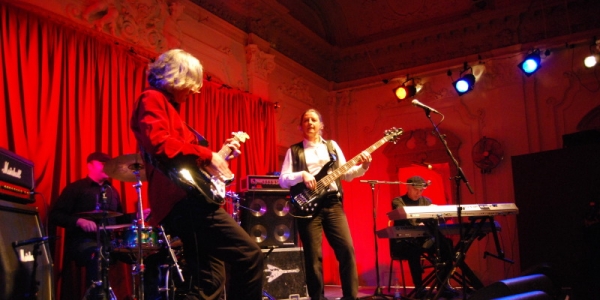Since their inception in 1976, their relentless touring ethic has taken them from Skopje, the capital of Macedonia, to LA, Uzbekistan, France, Canada, playing in classic rock venues like CBGBs to the opera houses in Canada and stadiums in the Balkans. Excited about the prospect of playing in Australia (and their first time “below the equator”) I asked Bodan Arsovski, the bass player, about their influences.
“The inspiration is coming from the Macedonian folk music which is very important, but jazz and rock are the sensibility.” Comparisons can be made to bands like the Mahavishnu Orchestra and Weather Report which feature a high level of musicianship typical of the progressive music of the ‘70s. What is more intriguing is how they incorporate this with Macedonian folk music.
Coming from a Macedonian background, I am familiar with the sounds and stories of the nation’s folk songs. The songs deal with universal human problems and they have, like most folk music, a timeless quality. For Australian audiences, Macedonian folk music may seem like a foreign proposition. I asked Bodan to describe the sounds. “Macedonian folk music is very original, most of the songs are full of sadness, pride, epic with deep emotions; some of them are full of happiness, clever, as you say ‘timeless’. In most of them the rhythm is irregular… the time signatures are 7/8, 9/8, 11/16, 13/16… I have a thought that it is very old ‘court music’”. The music uses the Phrygian major scale, familiar in Middle Eastern music, however the major tone gives the music a bitter-sweet quality.
Although Bodan describes it as “court music” some of the stories transport the listener to the Eastern-European village. A song that Leb i Sol cover called Uci me Majko, Karaj me majko (Teach Me Mother, Lecture Me Mother) revolves around a young man called Stojan, who asks his mother how to court a young woman, called Lilijana. She advises him to build a fountain – a source of water for the village – something so taken for granted in modern society. He builds the fountain and 300 countrymen arrive and all the lady’s friends but as the story goes – “that bitch Lilijana didn’t show.”
Regarding the timeless quality of the music, Bodan states his goal has been on other tours (such as Shadows In The Night) to reinvent the ancient Dionysian festivities: “Those festivities were happening in the region in four well known antique theatres (Stobi, Heraclea, Lihnidos and Skupi) for a couple of millennia. I have tried to catch spirit of those localities and to represent the story of the origins of civilisation.” Their 30th anniversary live DVD shows the intense bond between the band and a stadium of fans displaying a continuation of the Dionysian energy through their music. Through evolving line-ups (they even had a certified guitar hero in Vltako Stefanovski for a period) the band have remained true to their original sound but sometimes with different configurations. Most recently they performed with symphony orchestra but on their Australian tour they will come as a five piece with Bodan, bass, Nikola Kokan Dimushevski, keyboards, Micho Bozikov, lead guitar and Mihail Parushev on drums. Inspired by the success of their thirtieth anniversary tour in 2007, the band entered the studio to record ITAKANATAKA (Like this… and onwards) a recording that captures their “trademark instrumental sound” with a modern approach to recording. The band are thrilled to be touring this album in Australia: “There is a feeling similar to first coming to USA in 1982. We would like Australians to hear our music, to feel our energy and I think all together we will have a good time.”
BY BOJAN STOJANOV







